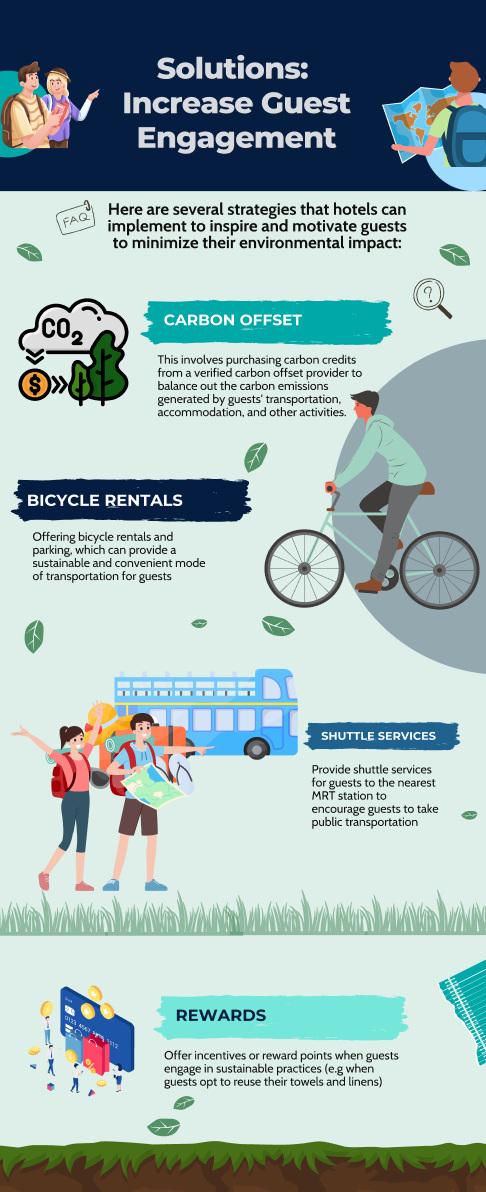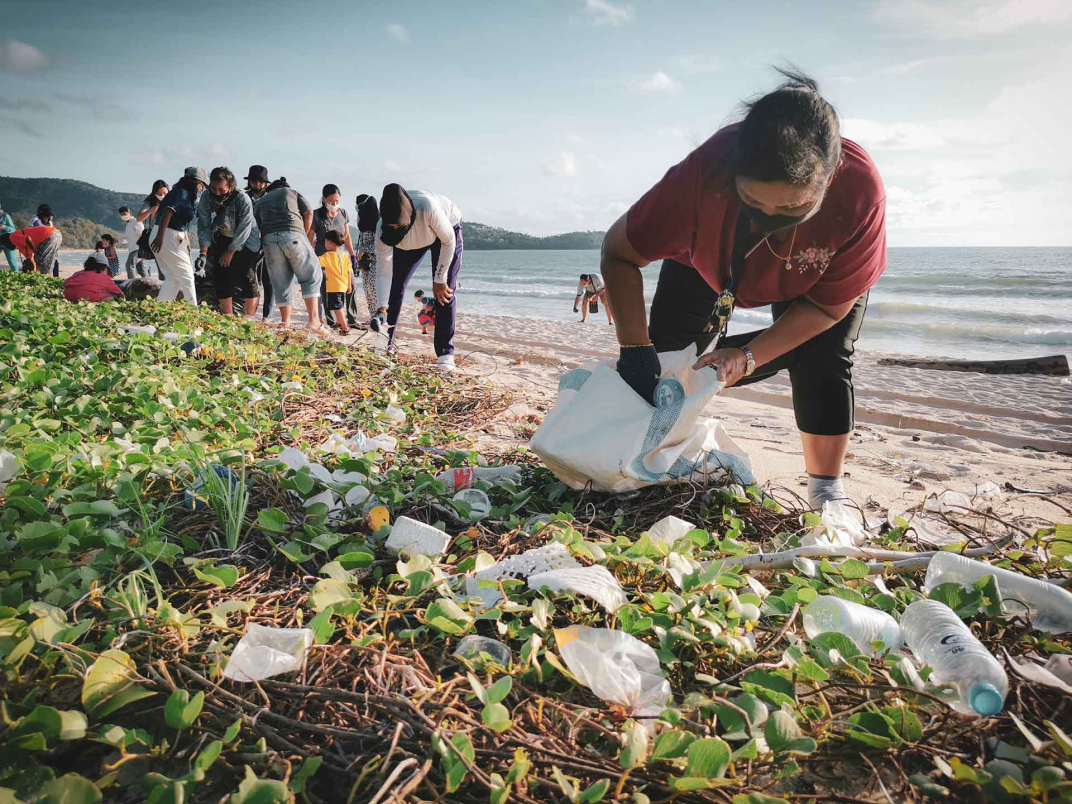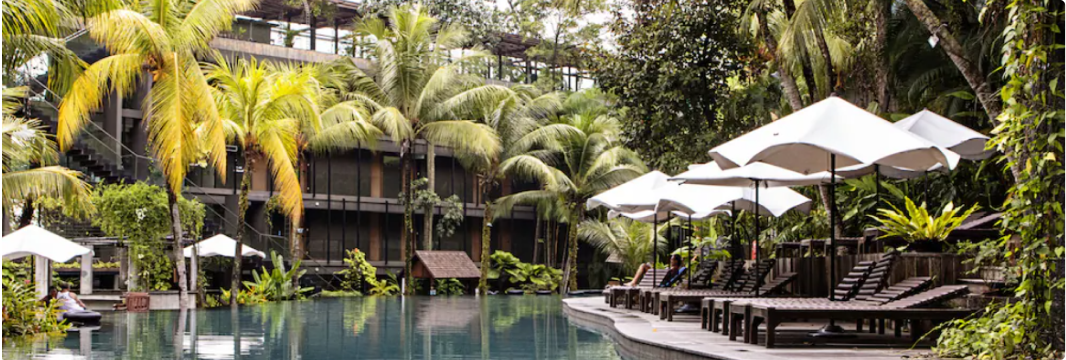
Introduction to Guest Engagement
The role of guest engagement is to manage guest interactions and experiences throughout their stay at a hotel.
Developing strong relationships with guests is extremely important, and a crucial part of achieving this is by prioritizing effective guest management. To build trust and loyalty with guests, hotels can embark on a journey to educate guests on sustainability practices and concepts. Over time, hotels with a good guest management framework are be able to enhance guest satisfaction levels while improving the brand’s reputation. All of these contribute to providing a positive guest experience that could lead to repeated business and guest referrals. Indeed, investing in sustainable practices can yield significant dividends for hotels that prioritize guest management as a core business strategy.
Sustainability is a complex and multifaceted concept which guests may struggle to truly comprehend. Hence, it is often difficult for hotels to predict their guests’ attitude and behavior towards sustainable initiatives without a strategic framework. Moreover, hotels tend to be a temporary and unfamiliar environment for guests, which makes it harder for them to be receptive to the sustainable strategies implemented.

Guest cooperation is key to the success of a hotel’s sustainability strategy. The guests’ buy-in plays a significant role in reducing the environmental impact of a hotel by minimizing their use of electricity, water and other resources. If guests abide by conservation practices, hotels could play a more pivotal role in sustainability.
To influence hotel guests to act sustainably, we recommend a strategic approach that involves an understanding of guest preferences and expectations, effective communication, awareness raising and education as well as providing sustainable options and incentives.
Therefore, a good guest management strategy can educate guests about sustainable practices and encourage their participation, helping hotels to achieve their sustainability goals and effectively contribute to protecting the environment.
Global Best Practices
Understanding guests’ expectations and needs
Hotels can gain valuable insights into guests' needs, preferences and expectations regarding sustainability and other areas of hotel operation by conducting stakeholder engagements with guests.
With this information, hotels can better understand guests’ level of awareness about sustainability, as well as any issues or concerns that they may have. Armed with this knowledge, hotels can develop and implement strategies to better address these issues, such as providing more information on sustainable practices or improving the sustainability of their products and services.
Some mode of engagement with guests:


Solutions
Hotels can offer services that encourage guests to reduce their environmental footprint.
Some common hotel offerings are:

Education
Case Studies
International
Banyan Tree Group - Green Imperative Fund

In 2001, the Banyan Tree Group launched the Green Imperative Fund as part of its commitment to sustainable development. The fund aimed to provide guests with the opportunity to contribute to environmental and community-based projects during their stay at Banyan Tree properties.
Under the Green Imperative Fund, guest under the “opt-out” arrangement will contrubite US$2 per room night at Banyan Tree branded properties, or US$1 per room night at Angsana, Cassia and Dhawa properties. The receiving property dollar-matches all such donations.
Each resort is given 20% of their previous year’s GIF contribution to spend autonomously on projects/ initiatives that have an external beneficiary. While allocation is at the discretion of the resort, use of the funds is governed by strict guidelines, with project administration limited to 20% of expenditure. In China, donations are made directly to and managed by the China Environmental Protection Foundation (CEPF), supporting projects mutually agreed upon, with CEPF providing quarterly progress updates to BTGF.
Through this program, Banyan Tree Group provides guests with a seamless opportunity to participate in environmental projects. This inclusive approach allows guests to play an active role in contributing to sustainable development during their stay.
References: | BTG2022_Sustainability_Report.pdf
IHG Hotels & Resorts - Solutions & Engage

IHG Hotels & Resorts (IHG), a global hospitality company, recognizes the vital role guests can play in contributing to sustainability efforts. With a commitment to responsible hospitality, IHG actively provides guests with opportunities to participate and make a positive impact.
IHG has collaborated with the Alipay app to enable users to earn virtual points by making low-carbon lifestyle choices. The programme is designed to promote awareness of environmental protection to guests and encourage them to contribute to decarbonisation through the award of green energy points for eliminating use of single-use dry amenities during their stay (such as toothbrushes, toothpaste and combs). More than half of IHG’s hotels in Greater China have taken part in the programme, with plans to expand its use in 2023.
In Australia, InterContinental Hayman Island Resort provides guests with a complimentary reusable water bottle upon check-in, which they can fill at the resort’s multiple filtered water stations to prevent the use of single-use plastics during their stay, along with sunscreen that’s specially formulated to be safe for the nearby coral reefs. Guests are also taken on an educational journey during their stay, learning all about the island’s sustainable projects and practices along with the neighbouring unique reef ecosystems
IHG's focus on guest engagement in sustainability not only benefits the environment and local communities but also enhances the guest experience. This positive experience creates a emotional connection to the IHG brand and fosters brand loyalty and advocacy.
References: W Hotels and Rent The Runway Team Up To Redefine The Rules Of Packing | Marriott News Center
Local
Mandarin Oriental Singapore - "Cycle for More"

Introducing the "Cycle for MOre" initiative by Mandarin Oriental Hotel Group (MOHG) in Singapore. This campaign provides guests complimentary access to specially designed Foldie and City bicycles for adults and kids, promoting eco-friendly exploration of the city.
By offering these bikes, MOHG aims to reduce carbon emissions associated with private hires. Guests have the option of two scenic routes: the "City Bike-Venture", showcasing Marina Bay's art and history, or the "Garden Bike-Venture" along the picturesque coastline.
As a bonus, guests can enjoy a complimentary 30-minute body scrub by booking a 60-minute Oriental Essence massage at The Spa.
This initiative empowers guests to contribute to decarbonization while experiencing Singapore's lush environment. It encourages a sustainable mode of transport, allowing guests to truly appreciate the city's natural beauty amidst its bustling urban life.
In summary, MOHG's "Cycle for MOre" campaign offers a distinctive and eco-conscious way for guests to discover Singapore while minimizing their carbon impact. This initiative represents a positive stride towards sustainable tourism, inviting guests to view the city through a greener lens and contributing to preserving the environment for future generations.
References: MO Cycle for More
Siloso Beach Resort - Sentosa - Ecotour

Siloso Beach Resort - Sentosa (SBR) is committed to environmental sustainability and leverages its facilities as a case study to promote environmentally friendly technologies and practices. The aim is to create awareness of environmental issues and foster a greater sense of compassion for the environment.
SBR's Eco Tour Programme offers guests an integrated view of sustainable practices. The resort serves as a real-life case study, showcasing various aspects of sustainability, including sustainable construction techniques that minimize the disturbance to the surrounding environment, maximise the use of natural light and ventilation and reduce wastage at all levels. During the tour, guests can learn about SBR’s water treatment and retention system, energy efficient technologies and SBR’s close loop food waste management.
SBR's Eco Tour Programme, implemented in 2009, has been highly successful in attracting stakeholders who are interested in sustainable practices and technologies. Over the last decade, more than 21,000 individuals from various key groups, including universities, schools, government bodies, corporate senior executives (SMEs & MNCs), and individual investors, have attended these tours. Additionally, the tours have gained international popularity, attracting visitors from around the world.
Through its Eco Tour Programme, SBR effectively showcased the feasibility and benefits of sustainable practices, creating awareness among diverse stakeholders and inspiring them to embrace environmentally friendly practices in their respective domains.
References: SBR Eco Tour | Silso Beach Resort - SBR Sustainabillity Report 2021 | UN Global Compact
Monitor & Review
The effective implementation of sustainable initiatives in hotels requires a proper measurement of guest engagement.
This enables hotel managers to gauge the extent to which guests are receptive to such initiatives and improve their current engagement levels accordingly. Through this process, hotels can build towards a higher level of guest engagement, which is essential for the success of any sustainable initiative.
To monitor guest engagement levels, there are several strategies that hotels can adopt. One of the most common strategies is to use guest feedback. By soliciting feedback from guests, hotels can gather valuable insights into their perceptions and experiences regarding sustainable initiatives. This feedback can be used to identify areas of improvement and develop targeted solutions to enhance guest engagement.
Another effective strategy is to monitor guest participation in sustainable activities. This can be done by tracking attendance rates for events and activities related to sustainability. By analyzing attendance data, hotels can determine which activities are most popular among guests and adjust their offerings accordingly. Additionally, this data can help hotels identify areas where they need to improve their sustainability offerings to increase guest participation.
Overall, monitoring guest engagement is a critical component of any sustainable initiative in the hotel industry. By using feedback and attendance data, hotels can gain valuable insights into their guests' perceptions and behaviors, allowing them to improve their sustainability initiatives and build towards higher levels of engagement.
